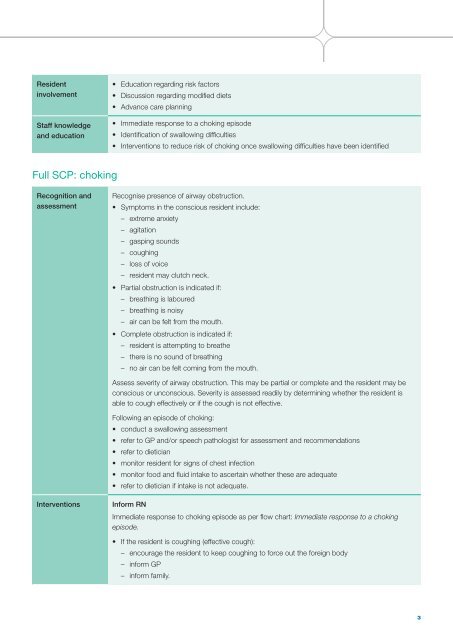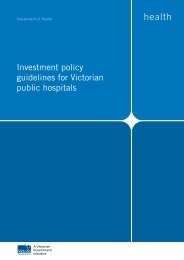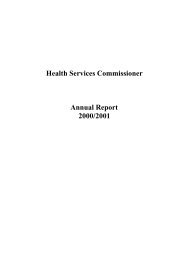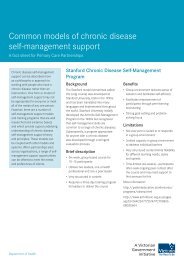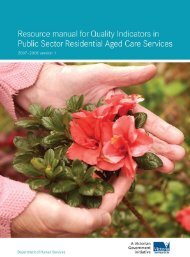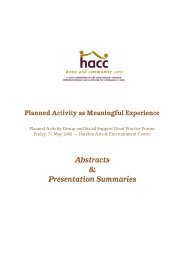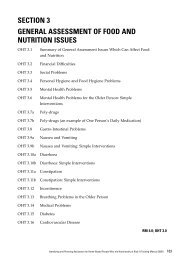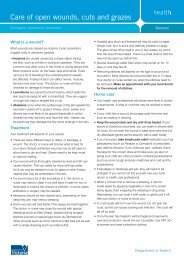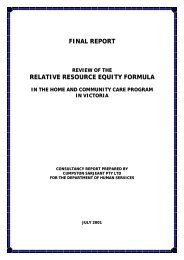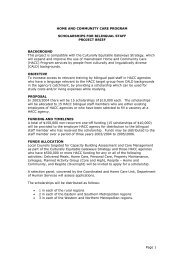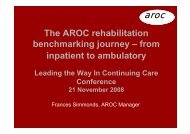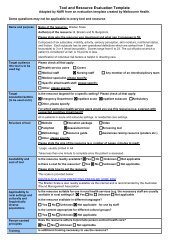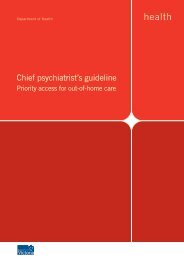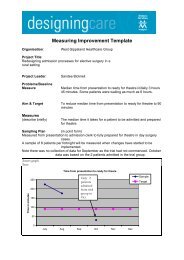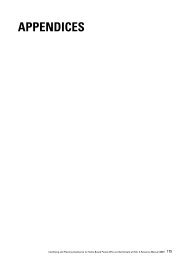Standardised care process - choking (138kb, pdf) - Department of ...
Standardised care process - choking (138kb, pdf) - Department of ...
Standardised care process - choking (138kb, pdf) - Department of ...
You also want an ePaper? Increase the reach of your titles
YUMPU automatically turns print PDFs into web optimized ePapers that Google loves.
Resident<br />
involvement<br />
Staff knowledge<br />
and education<br />
• Education regarding risk factors<br />
• Discussion regarding modifi ed diets<br />
• Advance <strong>care</strong> planning<br />
• Immediate response to a <strong>choking</strong> episode<br />
• Identifi cation <strong>of</strong> swallowing diffi culties<br />
• Interventions to reduce risk <strong>of</strong> <strong>choking</strong> once swallowing diffi culties have been identifi ed<br />
Full SCP: <strong>choking</strong><br />
Recognition and<br />
assessment<br />
Recognise presence <strong>of</strong> airway obstruction.<br />
• Symptoms in the conscious resident include:<br />
– extreme anxiety<br />
– agitation<br />
– gasping sounds<br />
– coughing<br />
– loss <strong>of</strong> voice<br />
– resident may clutch neck.<br />
• Partial obstruction is indicated if:<br />
– breathing is laboured<br />
– breathing is noisy<br />
– air can be felt from the mouth.<br />
• Complete obstruction is indicated if:<br />
– resident is attempting to breathe<br />
– there is no sound <strong>of</strong> breathing<br />
– no air can be felt coming from the mouth.<br />
Assess severity <strong>of</strong> airway obstruction. This may be partial or complete and the resident may be<br />
conscious or unconscious. Severity is assessed readily by determining whether the resident is<br />
able to cough effectively or if the cough is not effective.<br />
Following an episode <strong>of</strong> <strong>choking</strong>:<br />
• conduct a swallowing assessment<br />
• refer to GP and/or speech pathologist for assessment and recommendations<br />
• refer to dietician<br />
• monitor resident for signs <strong>of</strong> chest infection<br />
• monitor food and fl uid intake to ascertain whether these are adequate<br />
• refer to dietician if intake is not adequate.<br />
Interventions<br />
Inform RN<br />
Immediate response to <strong>choking</strong> episode as per fl ow chart: Immediate response to a <strong>choking</strong><br />
episode.<br />
• If the resident is coughing (effective cough):<br />
– encourage the resident to keep coughing to force out the foreign body<br />
– inform GP<br />
– inform family.<br />
3


